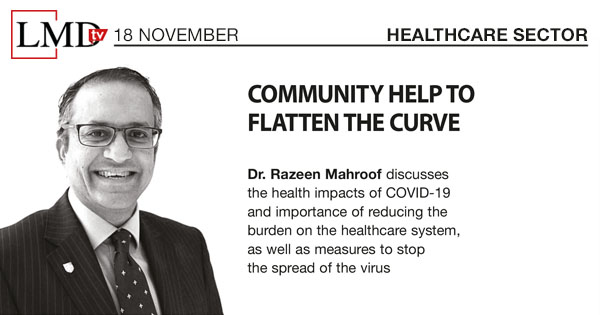
“With regard to the pandemic, since evidence of the novel coronavirus came to light in December 2019, cases have growth exponentially,” said Dr. Razeen Mahroof – Consultant in Critical Care Medicine and Anaesthesia at the John Farman ICU of Addenbrooke’s Hospital in the UK.
While noting that the mortality rate was estimated to be about 2.6 percent at the time, he pointed out that many COVID-19 cases have been unreported as well.
In addition to being spread by droplets and aerosols, Mahroof explained that there are documented cases of the virus surviving on surfaces for extended periods of time – up to 72 hours depending on the materials of those surfaces.
Despite this, he believes that measures such as avoiding opening postal packages are unnecessary precautions as being in the presence of the coronavirus doesn’t necessarily lead to infection.
He stated that the number of people with severe COVID-19 ranges between 10 and 20 percent of the population, which refers to those who need hospital services. About a quarter of them require intensive care support, which is posing a serious burden on resources globally.
“The severe disease is more likely in people who are male, elderly, overweight, diabetic, have high blood pressure and especially those with heart disease while emerging evidence may indicate this is true for those with kidney disease,” Mahroof mentioned although he noted that those with chronic lung disease did not seem to be at a higher risk than the rest of the population.
Furthermore, he discussed emerging evidence of ‘long COVID’ – i.e. long-term symptoms produced by the virus, which leads to people experiencing ongoing symptoms or chronic fatigue among other effects. Given this, he emphasised the need to abide by guidelines such as wearing masks and maintaining physical distance.
Mahroof warned: “If you let this disease rip through society, the mortality rate will increase – because the provision of resources and healthcare services will be overwhelmed by the number of cases to be tended to over an extended period of time.”
“Flattening the curve is a real phenomenon as it impacts survival so it’s important that everyone does their bit to try to reduce the rapid spread of the virus,” he stressed.
Commenting on the uncertainties related to the vaccines that have been developed, Mahroof remarked that we must be cautious, pointing out that vaccines have not been produced for RNA viruses such as COVID-19 while there may be other questions as to the logistical challenge of vaccinating the global population and ethical concerns regarding prioritised groups.
According to Mahroof, the asymptomatic spread accounts for between five and 10 percent of documented COVID-19 cases: “Following simple instructions to prevent this disease whether you’re symptomatic or not – such as wearing masks, distancing yourself from others and practising good hand hygiene – significantly reduces the risk of transmission.”
He disputed the idea that all governments and countries followed the same measures, saying they may have taken the same general measures but in different and confusing ways, and at various speeds, adding to the chaos in terms of how the pandemic is being managed.
Citing countries such as Taiwan and Germany, he indicated that discipline and compliance played a major role in curtailing the spread of the coronavirus: “Public education and confidence will be key to ensuring that these actions are effective.”
As part of his general advice to curb the spread of COVID-19, Mahroof declared: “Everyone must take this seriously, viewing their purpose as improving their own outcomes, as well as those of society and the world.”
He urged people to view their roles in preventing the spread as “vital,” reiterating that measures such as wearing masks and physical distancing would help prevent the impact of the virus and its damage while accelerating the world’s emergence from the crisis.




